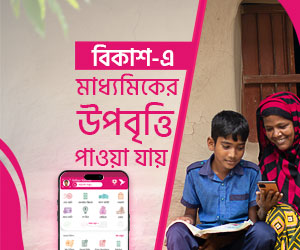Teaching English Through Teaching Manners
Though teaching manners to the children and students begin at home, school is a perfect place to teach them manners as they remain in the school for a significant portion of their daily life that necessarily offers them a nice opportunity for learning socialization. Students need to learn different kind of social manners to learn socialization. So, learning manners is a very important factor to lead personal, social and institutional life. When we take an attempt to teach our students manners not only in Bengali, but also in English as they learn it as a compulsory subject, it means they are getting twofold benefit at a time. Suppose, if someone walks into the room we can tell our students what they should do then ‘you should stand up to say hello.’
Classroom is an ideal place to learn many things at a time and teachers are the ideal persons to be followed by the children and students even more than their parents. Children think that their parents cannot always tell or do right things but their teachers can. So, teachers are the best available models before them. Teaching manners to the students is the responsibility of all teachers irrespective of their subjects. English teachers can take this advantage more than other teachers as they can seize the opportunity to teach them language as well.
When students are learning what to do in the classroom, in the market, at home and in different social institutions and functions and what not to do, these learning prove to be more practical and authentic. English teachers can take this advantage of teaching language that will definitely develop their linguistic ability and the ideas they have ingrained in them will continue reflecting in their habits in all social functions and institutions. Teachers can tell the students ‘Always say please if you ask for something to the people around you. While opening the door “Don’t” barge past someone. Say ‘Excuse me’ if you want to get past someone. Say ‘Sorry’ if you bump into someone, even if it’s their fault.’
Teaching or talking about personal hygiene is a good subject matter for practicing modals such as ‘should’ and rules of what students should and shouldn’t do in public. Don’t pick your nose. Don’t spit. Don’t burp. Cover your mouth when you sneeze and cough. To make them more convincing, interesting and impressive, teachers can play the role or mime while teaching these things. A teacher can distribute worksheets with the above general rules written on them and a space next to each rule and mime the unacceptable public acts described above and they can draw what they think you are doing next to the sentence. ‘Don’t speak with your mouth full. Put your knife and fork together on your plate when you have finished. Do not eat with your knife. Do not spit your food out onto your plate’. These are the manners to be observed while eating and we can teach these sentences to our students in English. It will obviously teach them manners and they will learn these sentences in their own speaking.
Cultural lessons become more relevant to the children if they can relate them to their own lives. (i) Don’t spit on the street. (ii) Don’t burp loudly after a meal. (iii) Don’t apologize if you bump into somebody on the street. (iv) Do say ‘please' and ‘thank you' at every opportunity. (v) Cover your mouth when you yawn or sneeze. (vi) Don’t pick your nose in public. Students can be taught these ‘do’s and don’ts’ in the classroom. They face these situations frequently in their practical life. An English teacher can these the students ‘when you make a phone call, introduce yourself first and then ask if you can speak with the person you are calling. Never use foul language in front of adults. Grown-ups already know all those words, and they find them boring and unpleasant. Do not make fun of anyone for any reason.’ Every single student needs to know ‘If he/she bumps into somebody, immediately he/she should say "Excuse me. Students should also follow "As you walk through a door, look to see if you can hold it open for someone else. If you come across a parent, a teacher, or a neighbor working on something, ask if you can help. If they say "yes," do so you may learn something new. When an adult asks you for a favor, do it without grumbling and with a smile. When someone helps you, say "thank you." That person will likely want to help you again.’
The world is not interested in what we dislike. So, we should keep our negative opinions to ourselves, or between us and our friends. We should not comment on other people's physical characteristics unless, of course, it's to compliment them. We should also teach our students ‘when people ask you how you are, you should tell them and then ask them how they are. When you have spent time at your friend's house, remember to thank his or her parents for having you over and for the good time you had.’
Sometimes kids just don't realize it's impolite to interrupt, pick their nose, or loudly. And in the hustle and bustle of daily life, parents don’t always have the time to focus on etiquette. But teachers should play the role here. Teachers can teach the students ``When asking for something, say "Please, when receiving something, say "Thank you." Do not interrupt grown-ups who are speaking with each other unless there is an emergency. They will notice you and respond when they are finished talking. If you do need to get somebody's attention right away, the phrase "excuse me" is the most polite way for you to enter the conversation. When you have any doubt about doing something, ask permission first. It can save you from many hours of grief later.’
Behaving politely is a way of life. It is not the case that children or students will have to be polite only in some particular places just formally and informally they can behave roughly. Or they need not practice good manners or behavioral activities only at school or social gatherings. These norms and etiquettes to be followed and observed everywhere to make them part of students’ habits. Basically, learning manners is a lifelong education. It does not happen overnight. Introducing one new social skill after another will make them quite aware of the ‘do’s and don’ts and they will learn English and Bengali side by side if a language teacher grabs the opportunity.
Using Dialogue and Role Play for Ensuring More Engaging Language Class
A dialogue tells us one kind of communication that happens either through speaking or writing and developing listening and speaking skills of the learners through the use of dialogues proves to be a more effective, engaging, interesting way of teaching English. Similarly role play stands as a communicative activity mostly through speaking and gestures that allows a learner to imagine the role of somebody else in a specific situation. Both dialogues and role play prepare our students in the classroom for the communication in a different social cultural environment and they get exposed to the varieties of situations in the classroom. Opportunities surface for the students to learn from playing a role and watching others and thus they can improve their listening, speaking and understanding English along with developing their confidence gradually removing their shyness and that is one of the significant objectives of teaching-learning situation.
Opportunities for interaction in the target language here I mean English usually gets limited as students have to study several other subjects. Language learning requires oral practice and active participation of the learners through the use of their different limbs –both internal and external. It is definitely true that students have limited hours in the classroom to practice language. So, the time they get must be fully utilized. The classroom exercises which are detached from real life situation or activities hardly attract the learners to get interest in it and the practice get lesser amount that means their scope to gain skills in English shows narrow.
Dialogues help students provide a context for the use of language and they are also a source of important grammar and vocabulary. Dialogues are usually familiar topic to the students and so they expect dialogue practice in the classroom. Dialogues serve as confidence boosters for the students as they don’t have to worry about producing language all on their own from the start. Dialogues provide models on which students can base their own conversations. Dialogues give students scope to practice language contextually and so a strong link develops between language and situation. Here situation indicates physical setting. With lower level students dialogues can be helpful in showing them how to use the target vocabulary and language structures that a teacher plans. Being encouraged when students make dialogues it means their exposure of creative nature. Dialogues can be used as a basis for listening comprehension exercises and they tend to develop the conversational skills of the learners. Dialogues are available in all textbooks named ‘English for Today’ taught in our primary, secondary and higher secondary level. Teachers can easily use them for making the students engaged and making the classes more interesting. In some classes gap filling exercises can be done while using dialogue. For example, take a dialogue and delete key words and phrases. Choose a pair of students to read the dialogue to the rest of class. Also, students can create their own dialogues and gap fills and quiz each other as a listening exercise. Students need to complete the dialogue based on the responses that a teacher provides. Another variation is to provide only the beginning or end of a sentence for each character, the rest to be filled up by the students participating in the dialogue session.
If we look at unit six (Going on a foreign trip) of EFT -8 we see a conversation between an immigration officer and Zara.
The immigration officer: Are you travelling alone?
Zara: No, I’m going with my aunt, uncle and cousin.
Officer: Is this your first visit to Thailand?
Zara: Yes
Officer: How long are you going to stay there?
Zara: seven to ten days
Officer: have a safe journey.
Zara: Thanks.
Another situation tells us some people waiting in front of a bus company. They begin to talk. This is not included in the text. A teacher can develop such kind of dialogue taking situation from a known scene.
Faruk: I think all of you are going to Moulvibazar to see tea plantations. Is that right?
Gloria: I am! Is this the right place?
Faruk: Yes, it is. The bus will be here soon. Is this your first trip to Sylhet?
Gloria: Yes, it is. How about you?
Faruk: No, it isn’t. I’ve been there two or three times before. Please let me introduce myself. My name is Faruk, and I’m from Bangladesh.
Gloria: Hello, Faruk. I’m Gloria. I’m from Mexico.
Faruk: I think you two are also Bangladeshi.
Nabila: Well, we’re actually British. But our grandparents were from Sylhet. You probably know that there are many Sylhetis in the UK.
This situation is happening outside of Bangladesh and it may make student more curious.
Anna: Hello! Washington, D.C. has many tourists! People from different countries come here. Today, my job is to interview tourists. I have to learn why they come here. This is very exciting! Excuse me. I’m Anna Matteo from The News. Do you have time for an interview?
Sabrina: Sure, I have time.
Anna: What is your name?
Sabrina: My name is Sabrina.
Anna: What country are you from?
Sabrina: I’m from Bangladesh.
Anna: So, you are Bangladeshi.
Sabrina: That’s right! My nationality is Bangladeshi.
These examples show that the conversations and words use in the dialogues are really practical as they happen in our day to day life/practical life. When learners see these situations and they themselves practice these dialogues, it means they are not only getting interest and imagining the real scenes set, they are basically learning grammar, sentence structure, vocabularies and developing their speaking skills removing shyness and hesitation.
Role play is another technique for teaching English effectively. Role play is the act of imitating the character and behavior of someone who is different from the person who plays the role. It’s a technique to allow students to explore realistic situations by interacting with other people in a managed way for developing experience and trial in different strategies in an environment that can be termed supportive. Why should we as teachers introduce this technique in the classroom while teaching English? We should use it for various reasons such as it bridges the gap between the classroom and the outside world by imitating real life situation and definitely it creates fun in the classroom .It strengthens learning and gives the opportunity to discover students’ own level of mastery in English. It strengthens the level of creativity as students create dialogue .It offers a good listening practice and provides an environment for understanding behaviors, expectations, and attitudes related to the target situation or culture. It enables a teacher to develop different skills like group work skills, negotiation skills, problem-solving skills, decision-making skills of the language learners.
Role plays are of several kinds. Students identify with persons in photographs, write his/her imaginary biography, and interview each other in their roles. This provides practice in simple past tense. This is known as picture role play. Students practice making polite requests. They are given picture cards showing cooking ingredients that they either need or have a lot of. They explain what they are cooking, and must borrow ingredients from each other. In ‘group improvisation role play’ two students improvise a scene, and others join and leave the improvisation, tying their roles and exit into the improvisation. Discussions can center on how strong emotions are expressed in different cultures. This is role switching role play.
When the use of dialogue and role play create opportunities for the learners to hear and use language in a meaningful context, we should use them in our classroom to teach English. Definitely they will add variety, bring change and make the class more interesting, enjoyable and more engaging.
চলবে...
লেখক: শিক্ষা বিশেষজ্ঞ ও গবেষক, ব্র্যাক শিক্ষা কর্মসূচিতে কর্মরত।
ইংরেজি কেন শিখব, কীভাবে শিখব ।। অষ্টাবিংশ পর্ব
ইংরেজি কেন শিখব, কীভাবে শিখব ।। ষট্বিংশ পর্ব
ইংরেজি কেন শিখব, কীভাবে শিখব ।। পঞ্চবিংশ পর্ব
ইংরেজি কেন শিখব, কীভাবে শিখব ।। চতুর্বিংশ পর্ব
ইংরেজি কেন শিখব, কীভাবে শিখব ।। ত্রয়োবিংশ পর্ব
ইংরেজি কেন শিখব, কীভাবে শিখব ।। একবিংশ পর্ব
ইংরেজি কেন শিখব, কীভাবে শিখব ।। বিংশ পর্ব
ইংরেজি কেন শিখব, কীভাবে শিখব ।। ঊনবিংশ পর্ব
ইংরেজি কেন শিখব, কীভাবে শিখব ।। অষ্টাদশ পর্ব
ইংরেজি কেন শিখব, কীভাবে শিখব ।। ষোড়শ পর্ব
ইংরেজি কেন শিখব, কীভাবে শিখব || ত্রয়োদশ পর্ব
ইংরেজি কেন শিখব, কীভাবে শিখব ।। দ্বাদশ পর্ব
ইংরেজি কেন শিখব, কীভাবে শিখব ।। একাদশ পর্ব
ইংরেজি কেন শিখব কীভাবে শিখব ।। দশম পর্ব
ইংরেজি কেন শিখব কীভাবে শিখব ।। নবম পর্ব
ইংরেজি কেন শিখব কীভাবে শিখব ।। অষ্টম পর্ব
ইংরেজি কেন শিখব কীভাবে শিখব ।। সপ্তম পর্ব
ইংরেজি কেন শিখব কীভাবে শিখব ।। ষষ্ঠ পর্ব
ইংরেজি কেন শিখব কীভাবে শিখব ।। পঞ্চম পর্ব
ইংরেজি কেন শিখব কীভাবে শিখব ।। চতুর্থ পর্ব
ইংরেজি কেন শিখব কীভাবে শিখব ।। তৃতীয় পর্ব








